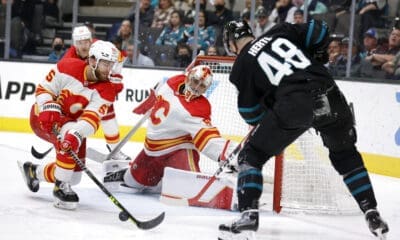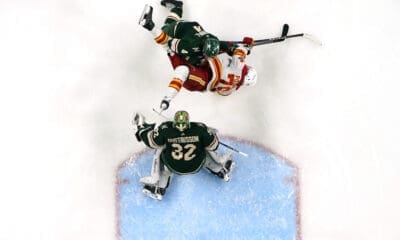Calgary Flames
The Change the Flames Need: Should Calgary Fire the Coach?

It's safe to say the problems Calgary faces are numerous: lack of high skill players, constant injuries, constant mismanagement, and poor coaching. However, some of these issues could be alleviated by directly solving only one: the poor coaching.
Very rarely do coaching changes have a noticeable difference on teams. Look at the Washington Capitalswith Bruce Boudreau and the Washington Capitals with Dale Hunter; look at the Anaheim Duckswith Randy Carlyle and Bruce Boudreau. In both cases things hardly changed. More often than not when a coach change occurs that seems to solve things it’s because of a coinciding player has been acquired or returned from injury (Darryl Sutter in LA with Mike Richards returning).
Still, there are times when a coach is a strong detriment to the quality of the team: Marc Crawford, Wayne Gretzky, John MacLean just to name a few. And while Brent Sutter is a perfectly capable coach in theory, he is not a perfectly capable coach for Calgary.
The hope and dream all Flames fans held on to when Darryl Sutter was let go was that Brent would finally be able to coach how he saw fit: the assumption having been that Darryl was the real coach and Brent was merely acting on his orders. For a short time, that assumption seemed to fit. Olli Jokinen and Jarome Iginla lined up together less, young players got more opportunities, and things just generally seemed to go in the right direction.
That concept crashed hard this season, however. The dreaded Jokinen-Iginla combo returned, the concept of matchups was completely and entirely ignored, and the Calgary Flames suffered.
So why would a change in coaching matter? Well, the single biggest problem with Brent Sutter's coaching is his simple misunderstanding of (or apathy towards) matchups. Jarome Iginla is still a quality player. Unfortunately, he's also on the downhill slope of his career, meaning while he still maintains high quality offensive skills, he doesn't have the ability to bring those out on a whim, and more specifically, he can longer longer drive possession, merely take advantage in the offensive zone when someone else sets up there.
So of course Brent Sutter gives him a sub 50% offensive zone start ratio. At 47.9%, Jarome Iginla is being asked to carry the puck up the ice, along with frequent linemate Olli Jokinen who's at a 48.8% ratio. Moreover, Jarome Iginla and Olli Jokinen are both being asked to play against the toughs with Jokinen sporting a QoC (Quality of Competition) of 0.115 (second hardest on the team) and Iginla with a 0.063 QoC (fifth hardest on the team). These are players, that given plenty of time in the offensive against weaker opponents would score at a significantly higher rate. These are players both in the bottom half of the team in CORSI Rel and similar possession stats. This play doesn't suit them, and it doesn't suit the team.
With a defense that's not very good to begin with made worse by injuries (case in point: Bouwmeester will likely play over half of the game tonight and both Butler and Brodie will likely hit around 24+ minutes), Calgary can't afford to be a defense first team. Instead, Calgary needs to place scoring above prevention and give its best scorers and offensive players the greatest chance to succeed. That means at a minimum Iginla should see a 55% offensive zone start ratio, if not 60%+.
That’s hardly the only issue. During the Flames 9-0 loss to Boston, enforcer and notable non-hockey player Raitis Ivanans found himself on the ice for over eleven minutes, about the same amount of time capable hockey players Brendan Morrison and Blake Comeau. Ostensibly he was brought in case the Bruins attempted any shenanigans, but even for pro-fighters (which I’m not) that would mandate four minutes of ice time tops, and less when it was clear that the Bruins wouldn’t do anything with the game so far out of reach.
All the nonsense about being a hard coach or a players coach- that's just nonsense. It's narrative meant to fill space in a newspaper sheet. The difference a coach makes is in where and how and when he uses his players, and Sutter's not making that difference. Whether Sutter is miscoaching by sheer ignorance or by sheer apathy, it's clear that he is, without a doubt, miscoaching. And when it's blatant that the coach is among a team's problems, it's time to let him go.
by Arik Knapp









